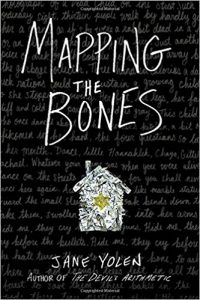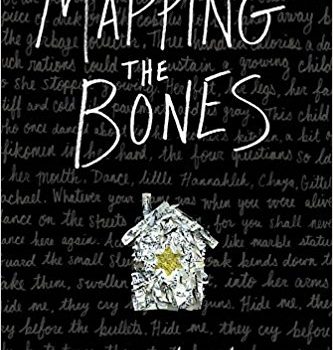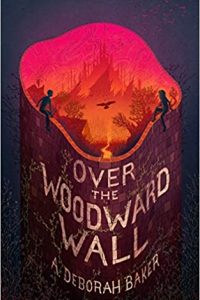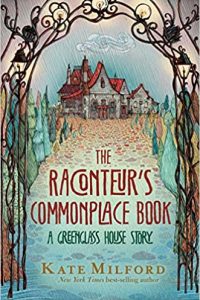Gary K. Wolfe Reviews Mapping the Bones by Jane Yolen
 Mapping the Bones, Jane Yolen (Philomel 978-0-399-25778-0, $17.99, 418pp, hc) March 2018.
Mapping the Bones, Jane Yolen (Philomel 978-0-399-25778-0, $17.99, 418pp, hc) March 2018.
I should point out up front that Jane Yolen’s powerful young-adult Holocaust novel Mapping the Bones is a straight historical without overt fantastic elements, although – like her earlier Briar Rose – it’s woven around the armature of a classic fairy tale, in this case “Hansel and Gretel”. Almost inevitably, considering its subject, it’s a horror story, and a fairly graphic one toward the conclusion. Maybe more to the point, given its more familiar plot features – a group of young people escape an oppressive, overcrowded city to join a scruffy band of rebels and later fall into the hands of a brutal totalitarian regime, and are even subject to the whims of a mad doctor – it serves as a useful reminder that not all dystopias lie in the future, and not all are fictional.
During her long career, Yolen has done as much as anyone to demonstrate the sheer usability of fairy and folk tales as ways of ordering experience in even the most extreme contexts, and I suspect it’s fair to say that the Holocaust has presented her with her greatest challenges in this regard. Thirty years ago, The Devil’s Arithmetic was a timeslip fantasy in which her young contemporary protagonist is magically transported back in time to experience the Holocaust firsthand – complaining in the novel’s first line, “I’m tired of remembering” (referring to her family’s Passover Seder), and saying passionately in the novel’s final line, “I remember.” That established what would become Yolen’s characteristic approach to this material – focusing on the importance of memory – and Briar Rose, four years later, turned memory into mystery, as the protagonist’s grandmother was so traumatized by her experiences that she could only relate them as a grotesquely distorted form of the fairy tale. That novel also lacked material fantasy, but the almost hallucinatory quality of the grandmother’s bizarre survival tale gave it a distinctly mythopoeic feel. In a sense, then, Mapping the Bones extends the pattern of those earlier works (along with a few short stories like “Sister Death”), which is a movement toward increasingly unmediated confrontation with material that clearly haunts her (as it does – or should – the rest of us). There’s no time travel here, no mysterious grandmother to investigate, but only the direct experiences of the twins Chaim and Gittel Abromowitz in the Lodz ghetto, later in the forests among partisans, and finally in a fictional Nazi work camp called Sobanek (a portmanteau of Sobibor and Majdanek).
As Yolen notes in an afterword, this follows the structure of “Hansel and Gretel”, who move from their impoverished home to the forest and finally the witch’s house, but direct parallels are only hinted at in the narrative (such as the bitterly ironic nickname given to the work camp, “the House of Candy”). The story unfolds in three ways: a third-person narrative mostly from Chaim’s point of view, Gittel’s memories from decades later, and Chaim’s poems, some of which he’s able to write on scraps of paper, but most of which he commits to memory and only later transcribes. We learn little of the family’s earlier comfortable life; the story opens in the ghetto, just as they learn they’ll have to share their tiny apartment with another family of four – a dentist, his fragile wife, and their two children, including the boorish Bruno. As word arrives that they are to receive a “wedding invitation” – an order to report to the trains for evacuation – Chaim and Gittel’s father hatches a risky plan to escape the ghetto and meet up with the partisans in the forest.
With eight characters involved in the escape effort, few readers would be naive enough to expect all of them to make it, but Yolen does a masterful job of conveying what it must feel like to see survival as a rapidly narrowing and darkening tunnel. Chaim and Gittel are sustained by their deep love and almost preternatural connection – they even have a secret twins’ sign language, which helps from time to time – as well as by Chaim’s poetry and Gittel’s ingenuity, which in a crucial scene directly echoes that of Gretel. Together, they are perhaps the most fully-realized and nuanced characters in all of Yolen’s Holocaust fiction, and – even given the manifest excellences of The Devil’s Arithmetic and Briar Rose – Mapping the Bones is the most fully-developed and immersive of these immensely humane and important novels.
Gary K. Wolfe is Emeritus Professor of Humanities at Roosevelt University and a reviewer for Locus magazine since 1991. His reviews have been collected in Soundings (BSFA Award 2006; Hugo nominee), Bearings (Hugo nominee 2011), and Sightings (2011), and his Evaporating Genres: Essays on Fantastic Literature (Wesleyan) received the Locus Award in 2012. Earlier books include The Known and the Unknown: The Iconography of Science Fiction (Eaton Award, 1981), Harlan Ellison: The Edge of Forever (with Ellen Weil, 2002), and David Lindsay (1982). For the Library of America, he edited American Science Fiction: Nine Classic Novels of the 1950s in 2012, with a similar set for the 1960s forthcoming. He has received the Pilgrim Award from the Science Fiction Research Association, the Distinguished Scholarship Award from the International Association for the Fantastic in the Arts, and a Special World Fantasy Award for criticism. His 24-lecture series How Great Science Fiction Works appeared from The Great Courses in 2016. He has received six Hugo nominations, two for his reviews collections and four for The Coode Street Podcast, which he has co-hosted with Jonathan Strahan for more than 300 episodes. He lives in Chicago.
This review and more like it in the March 2018 issue of Locus.
 While you are here, please take a moment to support Locus with a one-time or recurring donation. We rely on reader donations to keep the magazine and site going, and would like to keep the site paywall free, but WE NEED YOUR FINANCIAL SUPPORT to continue quality coverage of the science fiction and fantasy field.
While you are here, please take a moment to support Locus with a one-time or recurring donation. We rely on reader donations to keep the magazine and site going, and would like to keep the site paywall free, but WE NEED YOUR FINANCIAL SUPPORT to continue quality coverage of the science fiction and fantasy field.







